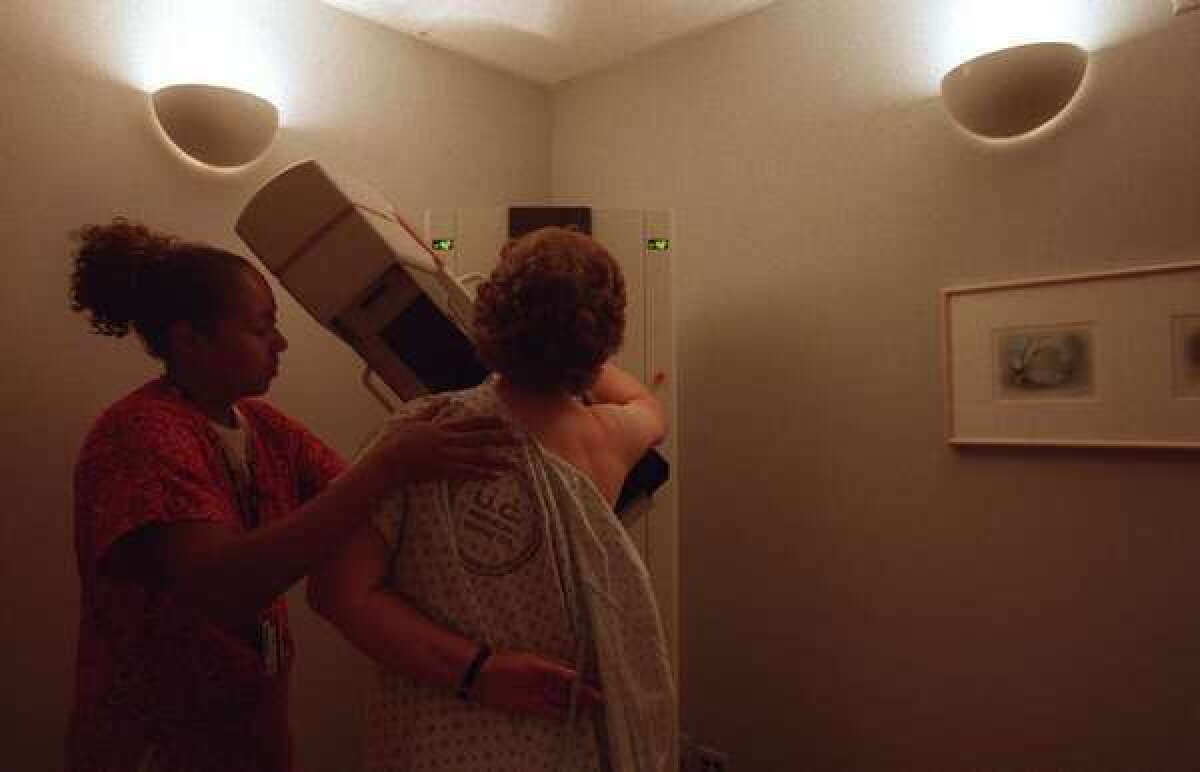In poll, 61% of doctors say mammograms should be less frequent

It’s been three years since the U.S. Preventive Services Task Force launched the mammography wars with its controversial recommendation that most women get fewer of the breast cancer screening exams -- one every other year between the ages of 50 and 74. Younger women could get tested if they wanted to.
The recommendations were made after researchers tested 20 screening strategies using six diferent models of how breast cancer grows and spreads. Task force members emphasized that routine mammograms catch three kinds of cancers: those that are too aggressive to be cured, those that could become deadly but are caught early enough to be treated, and those that would never cause any harm. Only women with cancers in the second category benefit from screening exams; meanwhile, widespread annual testing brings real harm in the form of false-positive test results and invasive, unnecessary treatment.
But many people vehemently protested, especially women (and their loved ones) who believe their lives were saved by screening mammograms that caught small, treatable cancers when they were in their 40s. The American Cancer Society continues to advise women to get screening mammograms annually beginning at age 40 and for as long as they are healthy. The American College of Obstetricians and Gynecologists also recommends annual mammograms beginning at age 40.
In November, the New England Journal of Medicine published three viewpoints about mammograms. One of them endorsed the American Cancer Society’s viewpoint, another endorsed the task force’s recommendations, and a third (by an epidemiologist and cancer surgeon in Norway) argued that routine mammographic screening should be done away with altogether. (There is widespread support for the use of mammograms in women with symptoms of breast cancer or those with a family history that suggests they’re at greater risk for the disease.)
This week, the journal published the results of an online poll to see which argument doctors found most persuasive.
Among the 1,240 who voted -- an unscientific sample, to be sure, but interesting nonetheless -- the strategy with the most support was the one backed by the task force. Fully 44% of those surveyed backed screening starting at age 50, while 39% sided with the American Cancer Society and 17% were ready to do away with screening mammograms.
The task force approach was most popular in North America, with backing from 47% of respondents. (Among this group, 40% backed the cancer society and 13% sided with the Norwegian expert.) Support for the cancer society guidelines was strongest in Central and South America, where 58% of doctors who answered the survey agreed that screening mammograms should begin at age 40. The idea that asymptomatic women should skip mammograms altogether was most popular in Europe, where 27% of doctors agreed with that sentiment.
What accounts for the discrepancies? That remains unknown, but the authors of the journal report made some observations:
“Some clinicians caring for patients with breast cancer cited personal examples of patients who seemingly benefited from early detection by mammography screening,” they wrote. “Others commented that a population health perspective can help us prioritize interventions that are unequivocally shown to reduce disease burden and increase life expectancy.”
Even on an issue as contentious as this, there is still some common ground, they wrote: “There is widespread agreement that mammography is a flawed screening instrument, because it detects lesions that are not cancer and can miss malignant lesions.”
You can read the poll results online here.
You can also read about the increase in aggressive breast cancers among younger women here.
Return to the Booster Shots blog.
Follow me on Twitter @LATkarenkaplan




